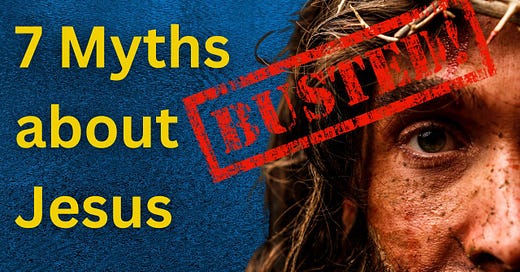Hi everyone, I am here to enjoy some Easter eggs and bust-up SEVEN myths about Jesus … and I just ran out of Easter eggs.
I want to do a quick take-down of several erroneous views about Jesus held not only by sceptics, but dodgy views even held by some Christians.
Let me give you the best, worst, and strangest “wrong” ideas people have about Jesus!
1. Jesus did not exist
I read somewhere that according to a survey in the UK that 20% of young people in Britain think that Jesus did not exist! Wow, that’s amazing, for how bad it is.
The apostle Paul wrote about historical Jesus within 20-30 years of his death. Paul quotes words from Jesus and recites events from his life. Paul knew people who knew Jesus. Paul may have even seen Jesus or knew about Jesus during his career as a zealous Pharisee.
Josephus’ Testimonium Flavianum, minus the obvious scribal glosses, refers to a historical figure of Jesus.
The Gospels show the impact of the historical Jesus on his earliest followers and the early Jesus-movement. They represent a mixture of faith and fact, history and hermeneutics, authenticity and artistry, but at the kernel of their origins is the man Jesus of Nazareth.
Even ex-Christian scholars of early Christianity like Maurice Casey and Bart Ehrman believe in a historical Jesus.
Also, other theories for how Christianity emerged without a historical Jesus are conspiratorial, speculative, and unconvincing.
I’ve done a video on this over at Nazareth to Nicaea but I also recommend to you Helen Bond’s podcast on Jesus of Nazareth over at The Ancients.
2. Jesus did not claim to be divine
We have to be clear here. Jesus did not walk around Judea and Galilee saying, “Hi, I’m God, I’m going to die for your sins soon, but first let me tell you some cute stories that one will day receive their definitive form when taught by talking vegetables.”
But - even apart from John’s Gospel - Jesus did claim to possess a sense of unmediated divine authority, the authority to forgive sins which even scribes regarded as an affront to Jewish monotheism (Mk 2:1-12). Jesus believed that his visit to Jerusalem was equivalent to the “visitation” of God (Lk 19:44), and at his trial he claimed that he would be enthroned beside Israel’s God and share in the orbit of divine sovereignty (Mk 14:62).
I like how Dale Allison put it (Constructing Jesus, 225, 304):
“[A]ll the primary sources repeatedly purport that Jesus had astounding things to say about himself. One can dissociate him from an exalted self-conception only through multiple radical surgeries on our texts” and “We should hold a funeral for the view that Jesus entertained no exalted thoughts about himself.”
For more on this, see the book I edited How God Became Jesus which is a response to Bart Ehrman, various parts of The New Testament in its World, and of course another video on this topic over at Nazareth to Nicaea.
3. The Son of Man is human and the Son of God is divine
It is commonly believed that “Son of Man” means Jesus is human, while “Son of God” means that Jesus is God. That is true in the sense that “son of man” can be idiomatic for a human being (as per Psalm 8) and “Son of God” can refer to Jesus as begotten from God in an ontological sense (as per John 1:14, 18).
However, both titles can also mean the opposite of that, a divine man and a human son.
In light of Dan 7:13-14, where “one like a son of man” receives power, glory, and dominion from the Ancient of Days, the Son of Man can be a heavenly and divine title, it seems to have this meaning in 1 Enoch and even in parts of the Gospels and Revelation. Also, Israel’s kings were sometimes called a “Son of God” in places like Psalms 2 and 89, going all the way back to 2 Samuel 7.
So, yes, divinity and humanity can fall on either sides of these two titles. For more, see my video on Who is the Son of Man?
To read further, consider joining the “Aviary” by taking out a paid subscription, only $7 per month or $75 per year, supports me in my ministry and scholarship, and gets you 3-4 posts per week on biblical studies, Christianity and gender relationships, cultural commentary, book reviews, previews of my forthcoming books, and some cool videos.




